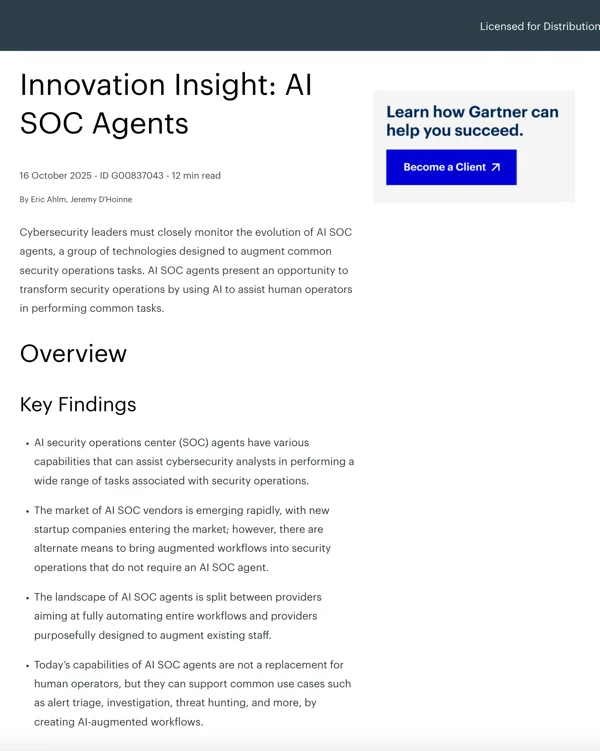
-min.webp)
Ask any SOC analyst what slows them down, and you will hear the same few answers: triaging noisy alerts, pivoting between disconnected tools, and waiting on someone else to investigate before they can act. Tiered SOCs, while once effective, are now a bottleneck. Tier 1 filters. Tier 2 investigates. Tier 3 makes judgment calls. But when every second counts, this hierarchy becomes a liability.
Today, threats are more complex and voluminous than ever before. To keep up, teams do not just need more speed. They need more autonomy, more consistency, and a smarter way to scale expertise. This is where the concept of an agentic SOC comes in.
An agentic SOC is a security operations center where AI agents operate with autonomy, reasoning ability, and full integration into human workflows. Together, these agents form an Agentic Security system that can triage, investigate, and even respond to security alerts and incidents. These agents do not just run playbooks. They analyze, decide, and act like a skilled human analyst would by triaging alerts, conducting investigations, and presenting conclusions with supporting evidence.
Instead of depending on rigid tiers, an agentic SOC empowers every team member with high-quality investigations and automated context. Analysts of any experience level can act on findings with confidence because the heavy lifting has already been done accurately, transparently, and in seconds.
{{ebook-cta}}
Let us walk through a real-world workflow. A suspicious login is flagged by your identity provider. In a traditional SOC, that alert lands with a Tier 1 analyst who may escalate it to Tier 2. They might pull logs, cross-reference with endpoint activity, and try to piece together what happened.
In an agentic SOC, the moment that alert fires, the agent begins a full investigation. It pulls identity, endpoint, and cloud telemetry. It checks for known threat behaviors, recent user activity, and peer comparisons. It surfaces anomalies and builds a case. Either this is a true positive that requires response or it is benign. And it shows its work.
The result? Human analysts review findings, not raw alerts. They spend time solving problems, not digging through noise.
Most automation tools in the SOC today are glorified task runners. They fetch data, run queries, or enrich alerts, but they do not actually investigate. They cannot make decisions. They do not know what questions to ask or what to do with the answers.
Agentic systems are different. They bring reasoning. They pursue lines of questioning. They gather evidence like a human would but at machine speed. And they explain their conclusions in language your team understands.
This transforms how SOCs operate:
The rise of large language models, combined with better system integrations, makes agentic workflows possible in a way they were not even a year ago. But more importantly, the needs of the modern SOC have changed. The old model, slow, siloed, and manual, no longer works.
Security teams need tools that think, not just execute. That delivers real decisions, not more dashboards. The agentic SOC is the next evolution.
Prophet Security is at the forefront of the shift toward agentic SOCs. Our approach centers on augmenting human analysts, not replacing them. With Prophet AI, security teams can scale their decision-making ability and investigative capacity without adding headcount or relying on brittle workflows.
Prophet AI acts as an autonomous analyst that works alongside your team. It triages alerts, investigates across tools, connects evidence, and provides clear findings with reasoning included. Analysts stay in control but move faster, make better decisions, and cover more ground.
Instead of climbing a tiered escalation path, analysts at every level receive the insights they need up front. The SOC becomes flatter, faster, and more resilient, built around human judgment that’s enhanced by machine precision.
Prophet Security is not introducing automation for automation's sake. We are enabling the kind of high-trust, high-efficiency operations modern security teams need to stay ahead of threats without burning out.
An agentic SOC is a security operations center that uses AI agents with reasoning ability and autonomy to investigate and triage alerts. These agents work like skilled analysts, gathering evidence, making decisions, and presenting findings in a way that integrates directly into human workflows.
A traditional SOC uses a tiered structure where alerts are escalated from Tier 1 to Tier 3. In contrast, an agentic SOC eliminates rigid escalation by using AI agents to perform investigations in seconds, providing analysts at any level with actionable insights up front.
The benefits of an agentic SOC include faster investigations, lower alert backlogs, consistent accuracy, and the ability for junior analysts to operate with senior-level efficiency. These systems scale expertise and reduce reliance on repetitive manual triage.
In an agentic SOC, when an alert is triggered—such as a suspicious login—the AI agent immediately pulls relevant data from identity, endpoint, and cloud sources. It investigates the activity, detects anomalies, and presents a full analysis so humans can act quickly and confidently.
Agentic AI goes beyond automation by reasoning through investigations instead of just executing predefined tasks. Unlike task runners or basic enrichment tools, agentic AI asks the right questions, follows logical steps, and explains its conclusions like a human would.
The agentic SOC is possible today because of advances in large language models and system integrations. As threats grow more complex and SOCs face burnout, traditional models fall short—making this the right time to adopt AI that can think and act with speed and precision.
An agentic SOC significantly reduces investigation time—from a median of 30 minutes to under 5 minutes. It also improves key SOC metrics like dwell time, alert backlog, and investigation coverage, resulting in a faster, more effective response to threats.
Agentic SOCs do not replace human analysts; they augment them. By handling time-consuming investigations, AI agents allow humans to focus on decision-making, threat response, and strategic work, ultimately increasing team capacity and effectiveness.
Get Gartner's guidance on evaluating and adopting AI SOC agents

